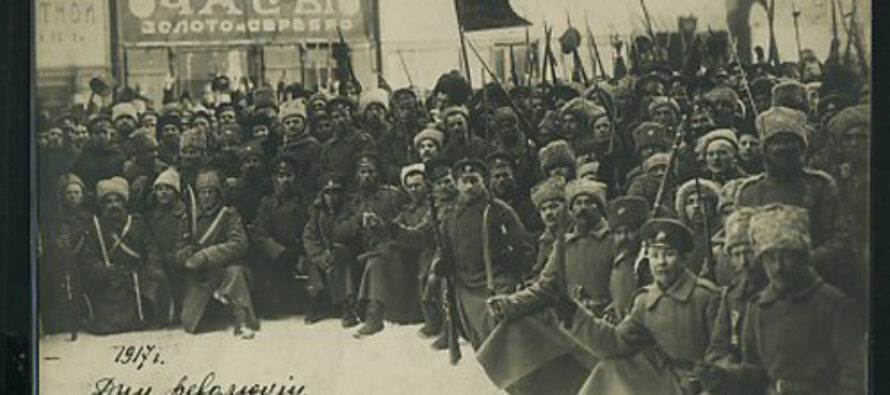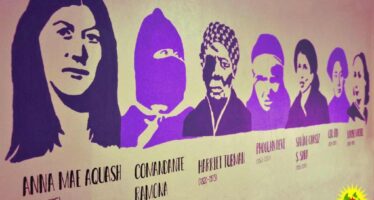ON A DAY THIS WEEK IN JULY 1919

![]()
ON A DAY THIS WEEK …

On a day this week, the 5th July, 1919, after more than 16 years struggling to organise the militant proletariat in both Germany and Russia, the communist and revolutionary, Eugen Leviné was shot dead by firing squad in Stadelheim Prison, in Munich’s Giesing district, following the defeat of the Munich Soviet Republic (aka the Bavarian Council Republic).
In his famous speech to his prosecutors at his trial, after the failure of both the Berlin and the Bavarian revolutions, Leviné stated:
“We Communists are all dead men on leave. Of this I am fully aware. I do not know if you will extend my leave or whether I shall have to join Karl Liebknecht and Rosa Luxemburg. In any case I await your verdict with composure and inner serenity. For I know that, whatever your verdict, events cannot be stopped. The Prosecuting Counsel believes that the leaders incited the masses. But just as leaders could not prevent the mistakes of the masses under the pseudo-Soviet Republic, so the disappearance of one or other of the leaders will under no circumstances hold up the movement.
And yet I know, sooner or later other judges will sit in this Hall and then those will be punished for high treason who have transgressed against the dictatorship of the proletariat.
Pronounce your verdict if you deem it proper. I have only striven to foil your attempt to stain my political activity, the name of the Soviet Republic with which I feel myself so closely bound up, and the good name of the workers of Munich. They – and I together with them – we have all of us tried to the best of our knowledge and conscience to do our duty towards the International, the Communist World Revolution.”
Eugen Leviné was born in St Petersburg in May 1883. After the death of his father in 1886 His mother, Rosalia, moved him to Germany, “settling in Wiesbaden and Mannheim.”[2] In Germany Eugen went on to study law in Heidelberg where he came in contact with Russian émigré Socialist Revolutionaries, ultimately breaking off his studies to participate in the failed 1905 Russian Revolution.
Of this period his wife Rosa Levine-Meyer, in her memoir ‘Levine: The Life of a Revolutionary’ (1973) says:
“It was in Heidelberg, in 1903, at the age of twenty, that Leviné for the first time in his life came into contact with Russian intellectuals, and became acquainted with revolutionary ideas. They found a powerful response in his restless mind, and no distractions or attempts at reconciliation with his society were ever able to stifle them.”
Escaping from exile in Siberia after the failure of the 1905 uprising and having worked for a period as an agent for the SRS, he returned to Germany where he joined the Social Democratic Party (SDP). In 1914 he met Rosa Broido whom he married, they had one child Eugene, who died in London in September 2005[3].
“When I went as a young student to Russia, I already realised that the activity of a political agitator consists only in formulating the historical will of the masses, not in forcing his own will upon them against their will. This principle governed my actions. I appealed to the masses. When they agreed with me, they responded. When they did not, I had unfortunately to play the part I did play and to reap the legal consequences of what others in their folly had sown. I say all this not to explain my personal attitude, but because it expresses the fundamental views of the Communist Party. This party is generally regarded as a group of people who set out to impose minority terror and dictatorship over the proletariat. Yet every line of the party programme testifies that the proletariat alone is destined to achieve its emancipation.”[4]
As in Russia, the war in Germany caused deep civil unrest and turmoil within the left, the majority of the social democrats supporting the war along with the trade unions, isolating the anti militarist left-wing activists which included Rosa Luxemburg, Frank Mehring, and Karl Liebknecht. Leviné became a supporter of this group within the SPD, from which emerged the Spartacus League (Spartakusbund) on 1 January 1916.[5]
Following the end of the war, and the success of the Bolshevik seizure of power and urged on by Karl Radek from the Bolshevik Central Committee, the members of the Spartacus League, including Eugene Leviné, Rosa Luxemburg, Karl Liebknecht, Max Levien, Leo Jogiches, Paul Frölich, Franz Mehring, Clara Zetkin and others established the German Communist Party (KPD) in December, 1918.
Rosa Luxemburg and Karl Liebknecht were brutally murdered in January 1919 following what was called the January revolt, (the ‘Spartacist Uprising’, 4-15 January 1919), a revolutionary wave that swept through Berlin. Seen as a Spartacist revolt, the social upheaval was far greater than that which the Spartacists or the newly formed communist party could have called on. Mass demonstrations and confrontations of workers were violently crushed by the use of troops loyal to the government and by the introduction of the Freikorps, “which had been raised more or less as death squads since the beginning of December”[6] This was a decisive defeat for the Left…and, at least in the death of Luxemburg, the loss of a significant Marxist theoretician.
At his trial, Leviné addressed this question of “leadership”:
“The main difference between myself and the Prosecution is that we regard all political and social phenomena, in Germany as well as in the rest of the world, from totally opposite angles. The Prosecuting Counsel overestimates the power and capacity of leaders to act and to influence events. He assumes that the dice of world history would fall differently according to whether they are cast by honest or dishonest leaders. But the leaders themselves emerge from the masses, even if from a different milieu. They become leaders not because they are superior to the masses but only because they are capable of formulating what the masses themselves intuitively desire but cannot express for lack of formal education. You will therefore find in your bourgeois circles a great many people superior to me in erudition, but at a workers’ meeting, I, Gentlemen, would carry the day – and not because of my personal superiority, but only because I would be expressing what the masses felt and wanted…”
By now, in the first months of 1919, mass demonstrations verging on armed revolts were spreading all over Germany. Council Republics were proclaimed in many states, most prominently in Bavaria which came to be known as the Bavarian Council Republic and eventually, better known, as the Munich Soviet, if only temporarily.
On the 7 November 1918, the first anniversary of the Russian October Revolution, Kurt Eisner of the Independent Social Democratic Party of Germany (USPD) declared Bavaria a “free state”, a declaration which overthrew the monarchy. Eisner became Minister-President of Bavaria. “Though he advocated a ‘socialist republic’, he distanced himself from the Russian Bolsheviks, declaring that his government would protect property rights.”[7]
Eisner, however, did not last long. In elections held in January his Independent Social Democrats were defeated and he himself assassinated in February. In March Adolf Hoffman of the SPD formed a coalition government – “the main concern of (which) was to consolidate its position amid a population that got increasingly impatient and demanded revolutionary action”[8] – that was so unstable that by 6 April it was overthrown by Ernst Toller, a playwright and Gustav Landauer, as well as other left anarchists such as Erich Mühsam, and a soviet republic, the “Bavarian Soviet Republic” was proclaimed. This too was unstable.
Leviné, in hiding following the defeat of the uprising in Berlin, was now instructed to go to Munich by Paul Levi, leader of the communist KPD, to take control of the situation. What had happened in Berlin must not be allowed to happen in Munich. Leviné was instructed that “any occasion for military action by government troops must be strictly avoided”. Leviné immediately set about reorganising the party to separate it off clearly from the anarcho-communists led by Erich and Gustav Landauer. He reported back to Berlin that he had about 3,000 members of the KPD under his control.
He also opposed the formation of the Soviet, calling on the workers not to engage in any “precipitous” actions. On the 4th of April, 1919, in a speech he stated:
“We Communists harbour profound suspicion of a soviet republic initiated by the Social Democrat minister Schneppenhorst and men like Durr, who up to now have combated the soviet system with all their power. At best we can interpret their attitude as the attempt of bankrupt leaders to ingratiate themselves with the masses by seemingly revolutionary action, or worse, as a deliberate provocation.
We know from our experience in northern Germany that the Social Democrats often attempted to provoke premature actions which are the easiest to crush.
A soviet republic cannot be proclaimed at a conference table. It is founded after a struggle by a victorious proletariat. The proletariat of Munich has not yet entered the struggle for power.
After the first intoxication the Social Democrats will seize upon the first pretext to withdraw and thus deliberately betray the workers. The Independents will collaborate, then falter, then begin to waver, to negotiate with the enemy and turn unwittingly into traitors. And we as Communists will have to pay for your undertaking with blood?”[9]
Erich Mühsam records his first encounter with Leviné in his account of the Council Republic, “Von Eisner bis Leviné” written in 1920 while incarcerated in the Ansbach Fortress:
“Finally, “comrade Niessen” spoke, also entirely unknown to everyone. We only got to know a few days later that his real name was Eugen Leviné. His talk had to be taken far more seriously than those of the previous speakers. Leviné mainly argued against collaborating with the SPD. He pointed at the SPD’s treacherous tactics in Berlin, in Hamburg, and especially in Bremen. Then he attacked the minister Schneppenhorst and the town major Dürr viciously, which caused strong reactions among the SPD members in the hall. Schneppenhorst almost got engaged in a fight.[10]
Eric Hobsbawm the historian, writes[11]:
Levine himself was opposed to it. After the proclamation of the Hungarian Soviet Republic on March 21, 1919, however a wave of utopian hope swept across the Bavarian movement. If they gave another signal, would not Austria also rise and a central European soviet zone come into existence? A Soviet Republic was proclaimed in Munich and enthusiastically joined by the numerous, often anarchist and semi-anarchist writers and intellectuals of what was Germany’s most celebrated Latin Quarter.
Toller’s role as president of the Bavarian Soviet Republic lasted merely six days. During this time Mühsam met with Leviné:
“The next day, I had a longer conversation with Leviné; it was the first and the last time that we spoke in private. Comrade Leviné assured me that he had absolutely no doubt about the sincerity of my actions. However, he sternly rejected my requests that the KPD become actively involved in the council republic. He said that he was personally convinced of the hopelessness of the government’s work. When I said, “But we can’t just leave the cart stuck in the mud!” he laconically replied, “Then pull it out.” He confirmed, though, that turning the country over to the Hoffmann government was out of the question. I suggested to Leviné that we be removed by force so that the hopeless situation would end and the revolutionary work secured. Leviné did not consider the time right for this but acknowledged that the fight against the bourgeoisie that had to be expected could only be led by his party. Although we had not found common ground, we parted with a handshake that transcended personal differences and that gave me hope that a political agreement was possible.”[12]
Despite Mühsam’s account, on Sunday, 12 April 1919, the communists seized power, with Leviné as their leader.
He immediately began to enact radical reforms, that included “expropriating luxurious apartments and giving them to the homeless and placing factories under the ownership and control of their workers. Levine also had plans to abolish paper money and reform the education system. However, he never had time to implement them.” He also argued that: “We must speed up the building of revolutionary workers’ organisations… We must create workers’ councils out of the factory committees and the vast army of the unemployed.”‘[13]
Levine refused to collaborate with the regular army of the city, and also organised his own army, the Red Army (Rote Armee) under Rudolf Egelhofer, similar to the Red Army of Soviet Russia. In order to support the revolutionary government, thousands of unemployed workers volunteered; soon the ranks of the Rote Armee reached 20,000.
It was at this time that the Red Guards began arresting suspected counter-revolutionaries and on 29 April 1919, eight men, including the well-connected Prince von Thurn und Taxis, were accused as right-wing spies and executed.[14]
Friedrich Ebert, leader of the Social Democratic Party, now arranged for 30,000 Freikorps under the command of General Burghard von Oven, to take Munich.
The Bavarian Soviet Republic issued the following statement: “The White Guards have not yet conquered and are already heaping atrocity upon atrocity. They torture and execute prisoners. They kill the wounded. Don’t make the hangmen’s task easy. Sell your lives dearly.”
Soon after, on 3 May 1919, the Freikorps together with these “White Guards of Capitalism” (having a force of 9,000) entered the Bavarian Soviet Republic and defeated the Communists after bitter street fighting in which over 1,000 volunteer supporters of the government were killed.
“In the early 20th century, Freikorps were raised to fight against the newly formed Weimar Republic, as well as their left-wing counterparts, through the early 1920s. These paramilitary organizations “roamed the countryside, killing with impunity.” “They engaged in bloody confrontations with republican loyalists and engineered some of the more notorious assassinations” of the Weimar period, and are widely seen as a ‘precursor to Nazism'”[15]
About 800 men and women were arrested and executed by these paramilitaries.
Leviné summarised their defeat at his trial:
“It was the tragedy of the Munich masses that they still had too little political experience. They were well aware that to achieve victory the entire proletariat must act as a body; but they believed that this body could have various programmes and that it was quite sufficient for the Social-Democrats, the Independent Socialists and the Communists to conclude a formal agreement.
This was actually one of the reasons for the defeat of the Munich Soviet Republic. When the proletariat is united in its will and purpose, it is invincible, but not when unity is established in a merely formal organisational way.[16]
“In the end, the KPD in Munich — and not only there, but throughout Germany — simply lacked the organizational strength or the mass mobilization to sustain the attempted revolution(s) against its inevitable foes. By May of 1919, its threadbare forces had been overwhelmed by right-wing soldiers and paramilitaries. Defenders of the city and actual or perceived revolutionaries were shot out off hand by the hundreds.”[17]
Of all the Council Governments the Munich Soviet Republic had held out the longest.[18]
Levine went into hiding.
Mr President, I know very well what I may bring on myself by this statement. But I must say that I have been provoked by the Prosecuting Counsel as never before in my whole political career. To justify his demand for the death sentence the Prosecution charged me with dishonourable motives, and based this charge above all on an accusation of cowardice – one of the gravest accusations that can be levelled against a man who has been engaged for sixteen years in the revolutionary struggle.
I am prepared to let that pass and will only say that if the Prosecution reprimands me for not having joined the Red Army after I withdrew from the government and had no more duties to fulfill, I must refer to the statement already made by my Counsel – namely, that I am guided by the code of honour prevailing among my own friends.
On the last evening we held a meeting, attended by workers, members of the Red Army and others, at which it was unanimously decided that members of the Red Army were to remain at their posts, while former members of the government were to “disappear”.
I disappeared. I disappeared, I “sneaked away” in agreement with my Communist friends. But not to save my skin.[19]
On 12th May he wrote to Rosa Leviné:
“At last I can send you a few words, my love, my dear. You were all the time beside me and my heart rejoiced when I thought of the last period of our life. During all those desperate hours, hours of terror, I was full of those memories. I recalled our talks, your words, your kisses and caresses. Don’t be sad Oslishechko. I am cheerful and full of energy. In spite of all the distress, I am looking to the future with confidence. As to us, I firmly hope that we shall be together very soon. And together with the child before my departure.”
Later that day Levine was arrested by the authorities. Levine’s cell was left open in the hope that he would be beaten to death as had happened with Luxemburg and Liebknecht. According to his wife: “Soldiers were constantly patrolling the corridors, entering his cell and keeping him in a state of great suspense.” A warder told his wife that “we were told that your husband ordered the execution of 10,000 prison warders and policeman.”
In June 1919, Leviné was put in trial, found guilty and condemned to death for ‘high treason, in accordance with Article 3 of Martial Law’.
“Leviné had opposed the declaration of the Council Republic but like Rosa Luxemburg before him he saw it as a matter of revolutionary honour to fight alongside the most militant section of the working class, even when he believed the struggle was doomed to defeat.” An honourable death and experience for the future is all we can salvage from the present situation”, he told fellow KPD members.”[20]
In this week, on this day, July 5, 1919, in a prison in Munich, and despite a campaign to stop his execution, Eugen Leviné was shot dead by firing squad.
Hobsbawn says Leviné: ‘a lucid, sceptical, efficient professional of revolution among noble amateurs living out the dream of liberation and confused militants…’:
“… knew that it was lost, but also that it had to fight. Though not lacking in at least passive support among the Munich workers, the Soviet Republic horrified the conservative and Catholic peasantry and the notably reactionary middle class of Bavaria to the point where they welcomed the joint invasion of government troops and Free Corps from all over Germany (including a Bavarian Free Corps). The Soviet Republic ended on May 1 and was drowned in blood. Eugen Levine its ablest leader, was one of the victims.”[21]
Bonner, in his book ‘Modernism at the Barricades’ says:
“… He would certainly have perished, perhaps even more cruelly, under Stalin. Leviné was not quite the saint that his wife, Rosa Leviné-Meyer, portrayed in her biography. But he incarnated the best of the Bolshevik spirit. He was unyielding and dogmatic, but an honest intellectual and totally committed to the most radical utopian ideals of international revolution.[22]
He is buried in the Neuer Israelitischer Friedhof Cemetery, in Munich.
Of his short 36 years alive Eugen Leviné had…fought in two of the major revolutions of the 20th century as well as spending over 16 years as organiser and agitator in the revolutionary struggle for the liberation of the proletariat.
There is much to be learnt from the life and work of this early 20th century communist and revolutionary. Spartacus Educational quotes Leviné at age 15:
“I should like to serve the people… Not by sham but by genuine service, not by offering them crumbs like the councillors of Rome to gain the sympathy of the masses, but by sincere work for their welfare… I wish to denounce the enemies of the people from the council tribunals, to protect the oppressed and to help them to establish their rights… That is my aim. That is what I vow to fulfill.”[23]
Leviné may well have survived oblivion by his famous phrase “we communists are all dead men on leave… ” but despite the slow death of revolutionary optimism beginning at the start of the 20th century and culminating in the destruction of the Berlin Wall in late 1989, his example of commitment to the most marginalised people of the period, the proletariat, allied to a theory of liberation, Marxism, and his deep conviction that a life without commitment has little meaning would be an example to our young people today whose role models in this consumer world are short lived ‘celebrities’ and whose goals of material consumption open onto a wasteland of inner desolation and a life barely worth living.
“The Prosecution has spoken of the internal peace which I have endangered. I did not endanger it, because internal peace does not exist. As long as the word “socialism” merely heads the notepaper of the various governments there can be no internal peace; and as long as there are shareholders who could double their fortunes in the five years of war without doing a stroke of work, the workers will try to claim their share of that increased wealth and the shareholders will not allow it.
Take a look round!.. and you will understand that we have not endangered the internal peace; we have only revealed that internal peace does not exist. And so long as it does not exist this struggle will go on.
… Such was my life…
and it is not compatible with lust a for power…
or with cowardice.”
séamas carraher
*****
Find Eugen Levinés Last Speech here:
and here:
*****
References
[1]By unknown photographer, early XX century,
(http://www.spartacus.schoolnet.co.uk/GERlevine.htm) [CC0], via Wikimedia Commons
[2] https://en.wikipedia.org/wiki/Eugen_Levin%C3%A9
[3] http://www.theguardian.com/news/2005/sep/15/obituaries.mainsection
[4] http://regroupment.org/main/page_levines_last.html
[5] [https://en.wikipedia.org/wiki/German_Revolution_of_1918%E2%80%9319
[6] https://en.wikipedia.org/wiki/German_Revolution_of_1918%E2%80%9319
[7] https://en.wikipedia.org/wiki/Bavarian_Soviet_Republic
[8] Erich Mühsam, “Von Eisner bis Leviné” in Gabriel Kuhn, ©2012 PM Press
[9] http://spartacus-educational.com/GERlevine.htm
[10] “All Power to the Councils! A Documentary History of the German Revolution of 1918-1919″, Edited and translated by Gabriel Kuhn, ©2012 PM Press
[11] Eric Hobsbawm, The German Revolution (1973), quoted by John Simkin, http://spartacus-educational.com/GERlevine.htm
[12] Erich Mühsam, “Von Eisner bis Leviné” in Gabriel Kuhn, ©2012 PM Press
[13] http://spartacus-educational.com/GERlevine.htm
[14] http://www.ww1-propaganda-cards.com/Munich%201919.html
[15] https://en.wikipedia.org/wiki/Freikorps
[16] http://regroupment.org/main/page_levines_last.html
[17] http://www.executedtoday.com/2014/06/05/1919-eugen-levine-bavarian-soviet-leader/
[18] https://en.wikipedia.org/wiki/German_Revolution_of_1918%E2%80%9319
[19] http://regroupment.org/main/page_levines_last.html
[20] http://regroupment.org/main/page_levines_last.html
[21] Eric Hobsbawm, The German Revolution (1973), quoted by John Simkin, http://spartacus-educational.com/GERlevine.htm
[22] Bronner, Stephen Eric (2012). Modernism at the Barricades: Aesthetics, Politics, Utopia. New York City: Columbia University Press. Page 131
[23] http://spartacus-educational.com/GERlevine.htm
Related Articles
For Hernán Monardes, Jesuit
![]()
Victor Jara, poet, singer-songwriter, and left-wing political activist was arrested at the Technical University (today the Universidad de Santiago) shortly after the start of the military coup of 11 September 1973
Freemuse appeals to Turkish Prime Minister
![]()
Artist Ferhat Tunç is facing a 15 years jail sentence because of a speech he made at the Eruh-Çirav Festival.
Anna Mae Aquash – From the US to Kurdistan: the indigenous struggle for freedom
![]()
“I won’t stop fighting for my country until I die” (Anna Mae)




